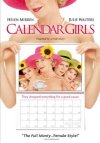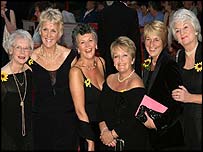BUY THE DVD:
|


|
|
|
SYNOPSIS:
| |
12 members from a mature ladies group in northern england try to raise money for a donation to a lukemia ward in memory of one of their husbands.
|
|
|
MOVIE FACT:
| |
had its world premiere at the locarno international film festival in august, 2003.
|
|
|
RATING:
|



three out of four possible stars
|
|
|
|
Owing mostly to the touching performances by lead actresses Helen Mirren and Julie Walters, Calendar Girls is a film that resembles many of the "small folks against the world" type of films that became a popular British export after the success of The Full Monty (also a film that deals with nudity, interestingly enough), but which should fare better in the marketplace than most of the films of this genre to follow 1997's Monty. Based on a true story (with a certain amount of fictionalization for the sake of dramatizing actual events for the screen), Calendar Girls concerns a group of women in Yorkshire, UK who decide that taking their clothes off to pose for a calendar would fetch more money than the usual gardening and like themed calendars their women's club has put out in the past.
With the goal of earning enough money to buy a couch to donate to the cancer ward of the local hospital (which would cost about 900 pounds), and knowing that past calendars have just barely coasted into profit territory, "Chris Harper," Helen Mirren's character, gets the idea that a nude, "art" calendar would fly off the shelves. After securing the okay of several members of the group, Harper and "Annie Clarke" (Julie Walters' character), in whose husband's memory the couch will be donated, On the way to press, the girls hit a variety of comedic and dramatic road-blocks, cementing this film's position in the category of "dramedy," a term usually used in television, but which can also apply to feature films, which describes a story that equally straddles the border between comedy and drama.
Something that British filmmakers seem to excel in is the construction of this type of bittersweet comedy that lends itself so well to both laughter and tears. While the circumstances and lives of the characters might seem overly bleak, the filmmakers are adept at using humor to enhance a serious situation to make it more palatable for audiences to digest. But given the strength of the actors in this film, the filmmakers could have tackled the subject in any number of ways and would have come up with an engaging film. Very deserving of their past acting nods and accolades, Walters and Mirren, though part of an ensemble cast, are the main focus of the film and honor the real-life "calendar girls."
Though it should be said that the running time might have benefited from a more tightly edited second half. Reducing the length of the picture from 108 minutes to around 100 would have allowed the conclusion to seem less drawn-out than it was. Had the actresses not been so strong in their roles, the movie could have suffered greatly. All of the roles are filled by capable actors, but as with many British films, it's difficult to impugn any of the performances. If a story of this type is to suffer, it usually stems from a lackluster script or tired dialogue that even the best actors can't improve. And even though the script for this film is by no means revolutionary, the dialogue is fresher than most and suitably charming.
The cinematography is given the benefit of a beautiful northern England location and the classic stone-lined meadows and steeply rolling hills of the area are featured heavily in many outdoor scenes, giving the film a beautiful quality that other recent British "dramedy" imports have lacked (The Full Monty, Billy Elliot, and Lucky Break among them). But a film requires more than a spunky story and beautiful vistas. And in casting such actors as Ciarán Hinds (as Mirren's husband), John Alderton (as Walters' terminally ill husband), and Philip Glenister (as the brave calendar photographer) in supporting roles, the film is more than full of memorable and audacious performances.

The Real Calendar Girls in London at the premiere of their film. |
What's interesting about this picture is that while the story proceeds in a normal enough fashion, the basic plot of the film (middle-aged woman baring it all for a calendar) seems like something only Hollywood would dream up. But knowing that the real Yorkshire women have raised over a half a million pounds for charity makes this film a special experience for any viewer.
The classic rural UK vistas of thatched roof cottages and the like are a visually engaging backdrop for the story and are highlighted to the film's advantage. But it is also the actors and the women and men they portray that make this film a beautiful and enjoyable experience. It seems that the screenwriters weren't afraid to use humor to get their point across, but they fortunately kept the integrity of the original story intact, thereby allowing the film a hearty dose of affecting human drama. Although the film's story has been fictionalized from the actual events in some areas, the inspiring message still comes across loud and clear.
Review by Kelsey Wyatt.
| |
|